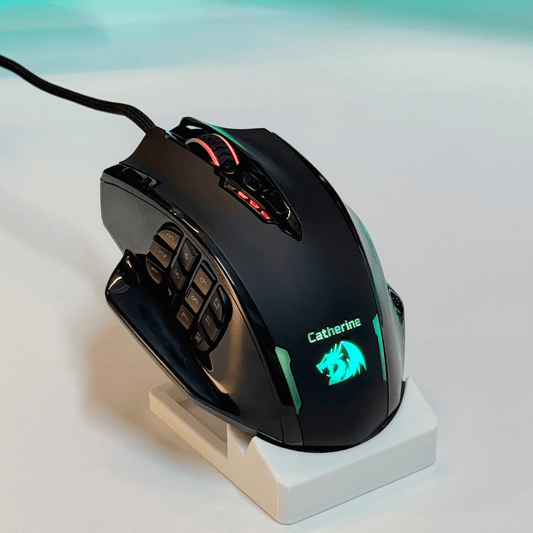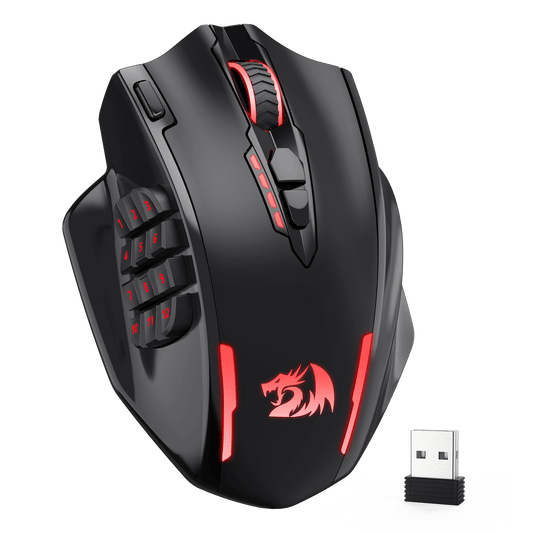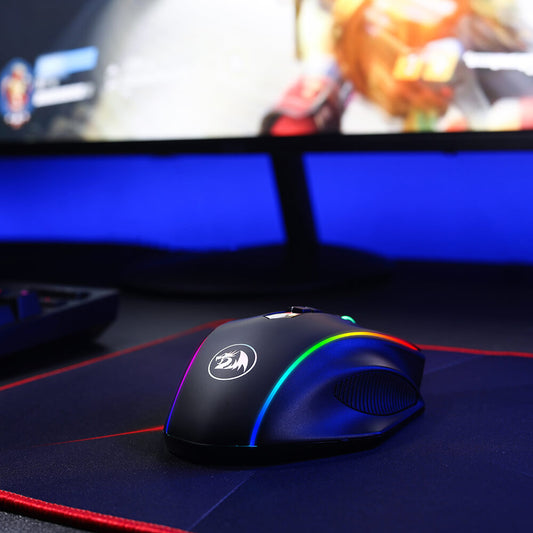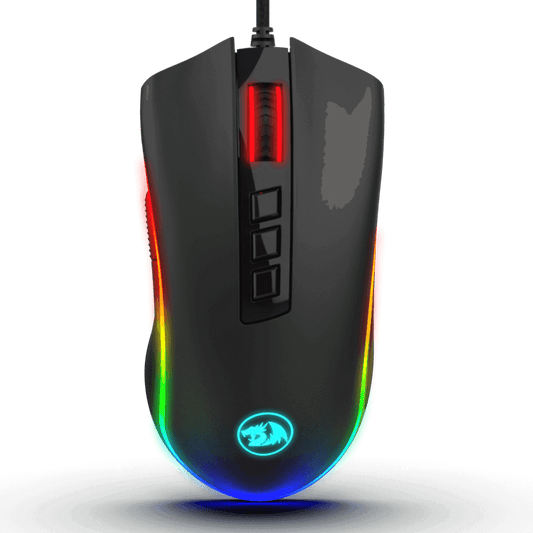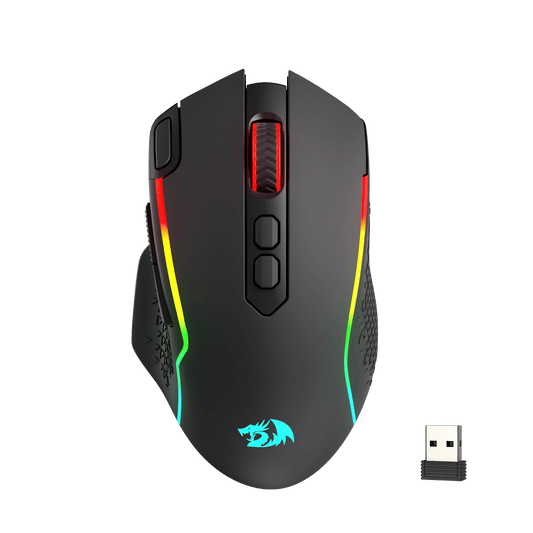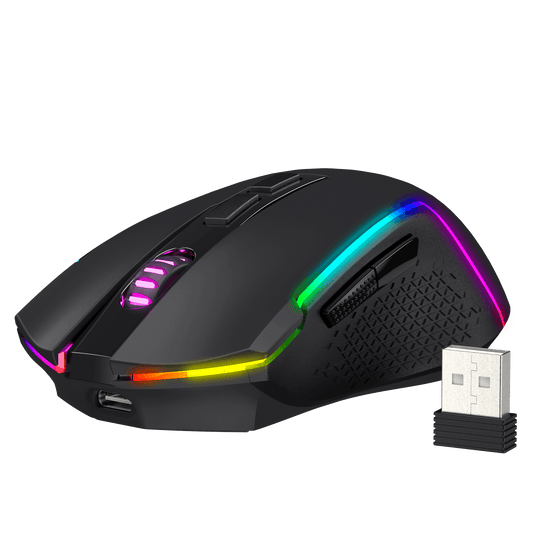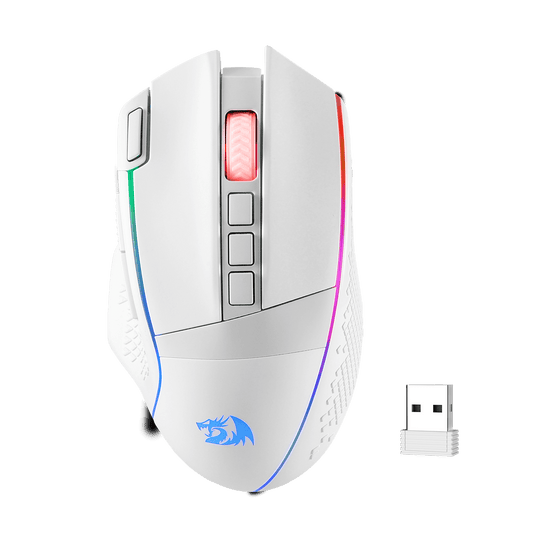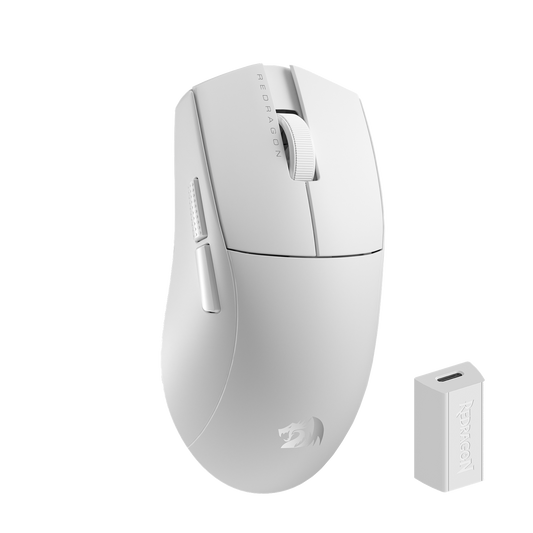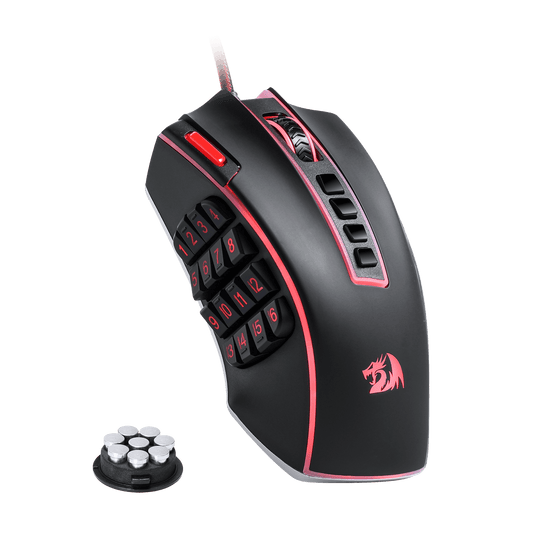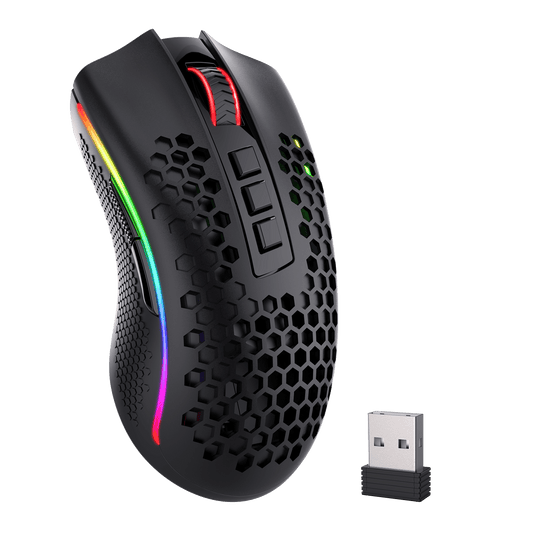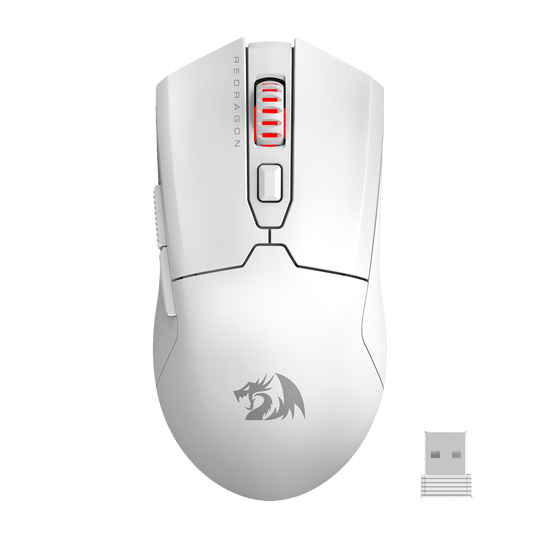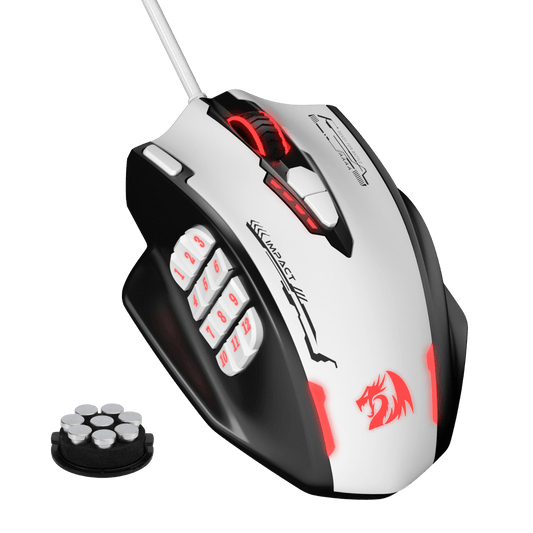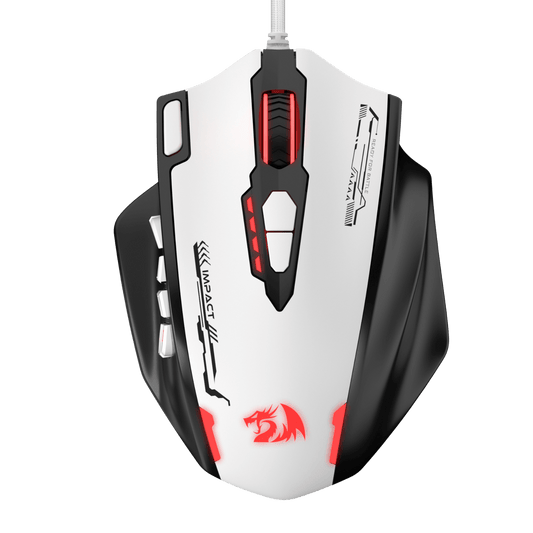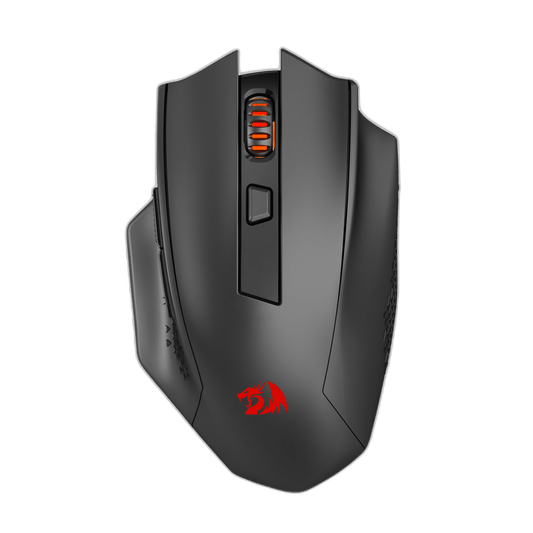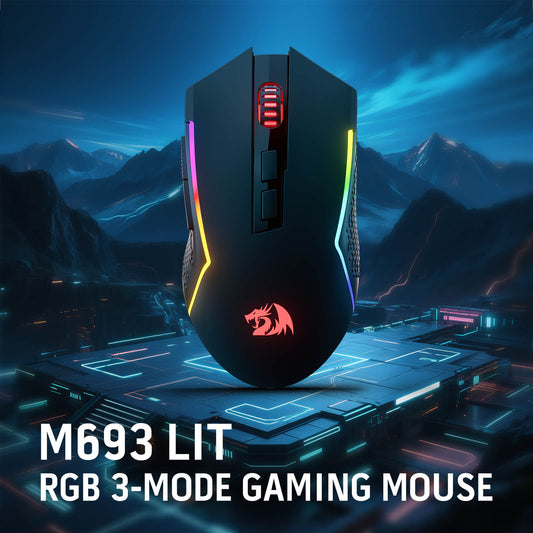Introduction
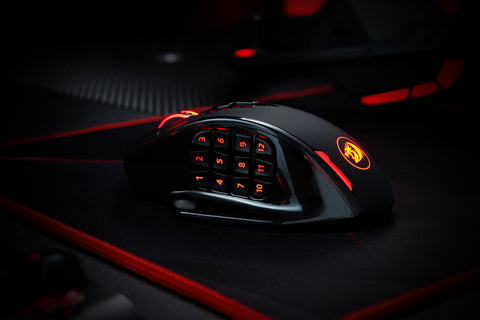
In the ever-evolving landscape of gaming, precision and responsiveness stand as the cornerstones of a truly immersive experience. Amidst the arsenal of gaming peripherals, one often overlooked yet crucial aspect is the mouse polling rate. As we embark on this exploration, we unravel the nuances of polling rate, dissecting its role in elevating your gameplay to unprecedented levels of accuracy and speed.
Table of Contents:
What is Polling Rate?
The polling rate of a gaming mouse is a fundamental metric that often goes overlooked by casual users. Simply put, it refers to how often the mouse reports its position to the computer. Measured in Hertz (Hz), the polling rate signifies the number of times per second that the mouse sends data to the computer.
Mouse Polling Rate Test
Understanding your mouse's polling rate is pivotal for an optimal gaming experience. By selecting a reliable online tool or software, creating a controlled testing environment, and running the test, you gain insights into your mouse's current polling rate. Experimenting with different rates allows you to pinpoint the setting that aligns with your playstyle. These tests unveil the practical implications, elucidating how polling rate variations impact cursor movement, gaming precision, and overall responsiveness. Here is an option: Devicetests
Example:
Why do People Adjust Polling Rate?
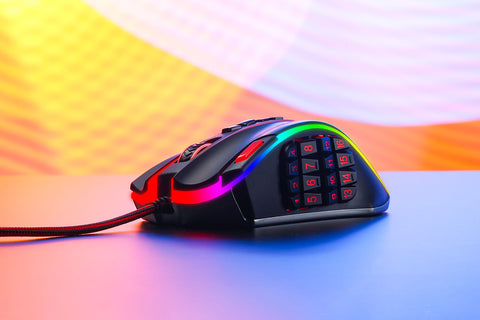
The concept of adjusting polling rates has gained considerable attention. This seemingly technical parameter holds a pivotal role in shaping the user experience, and here's why people find it essential to tweak it.
-
Precision and Responsiveness: One of the primary reasons individuals adjust polling rates is to fine-tune the level of precision and responsiveness of their input devices. A higher polling rate means more frequent updates on the device's position, translating to quicker response times. This is particularly crucial in fast-paced gaming scenarios where split-second reactions can make all the difference.
-
Gaming Performance Optimization: Gamers, in particular, are meticulous about every aspect of their setup. Adjusting polling rates allows them to customize their gaming experience, tailoring it to their preferences and the demands of specific games. A higher polling rate can contribute to smoother cursor movements and more accurate crosshair placement, enhancing overall gaming performance.
-
Balancing Act: Striking the right balance is key when adjusting polling rates. While a higher polling rate can improve responsiveness, it also requires more computing resources. Some users might find that an excessively high polling rate puts an unnecessary strain on their system without a substantial improvement in performance. Therefore, finding the optimal polling rate for both precision and system efficiency is a delicate equilibrium.
Does Polling Rate Affect Gaming?
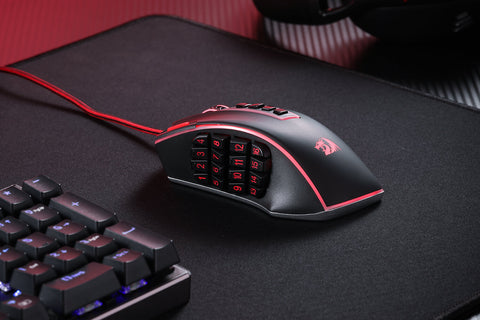
The polling rate stands out as a critical factor that can significantly impact the overall gaming experience. Here's a closer look at how polling rate affects gaming performance:
-
Enhanced Responsiveness: A higher polling rate boosts the frequency of mouse position updates, providing gamers with improved responsiveness and precision during fast-paced gameplay.
-
Reducing Input Lag: Elevating the polling rate contributes to minimizing input lag, creating a more immediate connection between the player's actions and on-screen responses.
-
Smoother Movements: A higher polling rate results in smoother cursor movements, advantageous in scenarios requiring precise aiming or quick, intricate maneuvers.
-
Personal Preferences: Gamers often experiment to find the optimal polling rate that aligns with their individual preferences and gaming styles.
-
Hardware Considerations: It's important to note that the impact of polling rate can vary based on gaming hardware and software, prompting gamers to fine-tune settings for optimal performance.
What's the Best Polling Rate for Gaming?
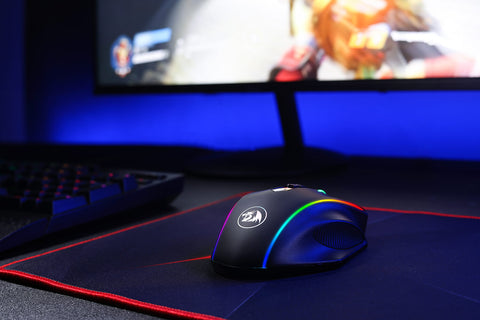
The best polling rate for gaming is a subjective matter, influenced by individual preferences and gaming demands. However, many gamers find that a polling rate ranging between 500Hz and 1000Hz strikes a balance between responsiveness and system efficiency. A higher polling rate within this range can enhance precision and reduce input lag, providing a smoother gaming experience. It's advisable to experiment with different rates to discover what feels most comfortable and responsive for your particular gaming setup and style.
How to Choose the Right Polling Rate for Your Needs?

Selecting the optimal polling rate for your needs involves considering various factors to ensure a seamless and responsive experience. Here's a guide to help you make the right choice:
-
Gaming Style: Consider your gaming preferences and style. If you're into fast-paced, competitive gaming, a higher polling rate can provide the responsiveness needed for quick and precise movements.
-
System Resources: Be mindful of your computer's capabilities. While higher polling rates offer increased responsiveness, they also demand more system resources. Ensure your gaming rig can handle the chosen polling rate without compromising overall performance.
-
Mouse Sensor Precision: Check your mouse's sensor specifications. Some sensors may perform optimally at specific polling rates. Consult the manufacturer's recommendations for the best pairing between your mouse and polling rate.
-
Personal Comfort: Experiment with different polling rates to find what feels most comfortable for you. It's a subjective choice, and some users may prefer a slightly lower polling rate for a balance between responsiveness and system efficiency.
-
Game Compatibility: Consider the specific games you play. Some games may respond differently to changes in polling rate. Test different rates to see how they impact your performance in various gaming scenarios.
-
Balancing Act: Strive for a balance between responsiveness and system impact. Adjust the polling rate until you find the sweet spot that meets your gaming needs without overburdening your computer.
How to Change the Mouse Polling Rate?
Adjusting the polling rate of your mouse is a straightforward process, and it generally involves accessing the settings through your operating system or dedicated mouse software. Here's a Redragon guide(Redragon M808 with software version 1.0.12) :
1. Download and Install Software:
- Visit the official Redragon website.
- Locate the download section and download the Redragon software compatible with your mouse model.
- Install the software on your computer.
2. Open Redragon Software:
- Launch the installed Redragon software.
3. Access Settings:
- Look for a section or tab related to "DPI"

4. Polling Rate Adjustment:
- Locate the option to adjust the polling rate. This may be displayed as "Polling Rate," "Report Rate," or a similar term.
5. Select Desired Polling Rate:
- Choose the polling rate you want from the available options (common rates include 125Hz, 500Hz, and 1000Hz).
6. Apply Changes:
- After selecting the desired polling rate, look for an "Apply" or "Save" button.
- Click on the button to confirm and save the changes.
7. Restart if Necessary:
- Some changes may require restarting your computer or unplugging and reconnecting the mouse for the adjustments to take effect.
Wired vs Bluetooth vs 2.4gHz Polling Connection Types
(Polling Rates in Wired vs Wireless Mice)

Choosing between wired and wireless mice depends on your specific needs. For competitive gaming and tasks that demand minimal latency, a wired mouse is often the preferred choice. However, 2.4GHz wireless mice can provide a good compromise between performance and convenience, while Bluetooth mice are versatile but may have slightly lower polling rates.
-
Wired
-
Wired mice typically offer the highest polling rates, often ranging from 125Hz to 1000Hz (1ms to 8ms response time). The direct, physical connection ensures minimal latency between the mouse and the computer, providing a responsive and instantaneous user experience, making wired mice ideal for gaming and precision tasks.
-
Wireless (Bluetooth)
-
Bluetooth mice generally have lower polling rates compared to their wired counterparts. Polling rates for Bluetooth mice can vary, with common rates ranging from 125Hz to 500Hz. While Bluetooth technology has improved over the years, it may introduce slightly more latency compared to wired connections, making them suitable for everyday tasks but potentially less optimal for competitive gaming.
-
Wireless (2.4GHz)
-
Mice using a 2.4GHz wireless connection strike a balance between wired and Bluetooth options. These mice often offer polling rates similar to wired mice, ranging from 125Hz to 1000Hz. The 2.4GHz wireless technology provides a more stable and responsive connection compared to Bluetooth, making these mice suitable for both gaming and everyday use.
Mouse Polling Rate Isn’t The Only Performance Factor

While the polling rate significantly influences a mouse's responsiveness, it's crucial to acknowledge that it's not the sole determinant of overall performance. Several other factors contribute to the user experience:
-
DPI/CPI Sensitivity:
- The sensitivity of a mouse, measured in Dots Per Inch (DPI) or Counts Per Inch (CPI), determines cursor speed. Higher DPI values offer precision, particularly in tasks like graphic design, while lower DPI settings may be preferable for precise aiming in gaming.
-
Sensor Type:
- Mice commonly feature optical or laser sensors, each with its advantages. Optical sensors prioritize accuracy and responsiveness, while laser sensors can function on various surfaces but might introduce minimal latency.
-
Acceleration and Deceleration:
- Mouse acceleration adjusts cursor speed based on physical movement. Preferences vary, with some users opting for consistency, while others find acceleration beneficial for rapid movements.
-
Build Quality and Ergonomics:
- The design, materials, and ergonomics of a mouse impact comfort during extended use. Choosing a mouse that aligns with your grip style and feels comfortable is essential.
-
Weight and Balance:
- The weight and balance of a mouse affect maneuverability. Some users prefer lightweight mice for quick movements, while others favor a heavier feel for stability.
-
Wired vs. Wireless Considerations:
- In addition to polling rate, the decision between wired and wireless connectivity influences latency, convenience, and the overall user experience.
Redragon's Best High Polling Rate Mice
Redragon M916 PRO 3-Mode Wireless Gaming Mouse (4K)

The Redragon M916 PRO stands out as a top contender in the gaming mouse market, especially for those who prioritize both style and performance. Available in striking pink, black, and white colors, it offers not just an appealing aesthetic but also top-tier functionality.
With its hype-speed 4K polling rate, the M916 PRO ensures ultra-responsive gameplay, a critical feature for competitive FPS gamers. The mouse's 49G ultra-lightweight design, combined with a high 26K DPI, makes it exceptionally agile and precise, ideal for quick flicking and dragging movements.
Equipped with an ergonomic natural grip build, it's perfect for various hand sizes and grip styles, though its slim profile might feel a bit thin for some. The textured forward side mouse button is a thoughtful touch, enhancing grip and usability.
Despite some critiques like the basic software and stiffer mouse switches, its overall performance shines. It offers seamless connectivity in both 2.4GHz and Bluetooth modes, with a simple switch between them, adding to its versatility.
For gamers seeking a lightweight, high-performing, and aesthetically pleasing mouse, the Redragon M916 PRO is a fantastic, budget-friendly choice.
Redragon M913 Impact Elite: High-Performance Gaming Mouse

Discover the prowess of the Redragon M913 Impact Elite, a wireless gaming mouse that also functions wired, tailored for the avid gamer. It features a top-notch 1000Hz polling rate for ultra-responsive gaming, combined with a high 16000 DPI, adjustable through 16 programmable buttons.
Equipped with the Optical Pixart 3335 sensor, the M913 ensures pinpoint accuracy with a 40g acceleration. This mouse is designed for endurance with a robust 45-hour battery life, ideal for lengthy gaming marathons.
With its RGB lighting, the M913 not only performs exceptionally but also adds a visually stunning element to your setup. The 12 side buttons are perfectly placed for quick access, enhancing your MMO gameplay.
Redragon M990 MMO Gaming Mouse: Precision and Control for Gamers
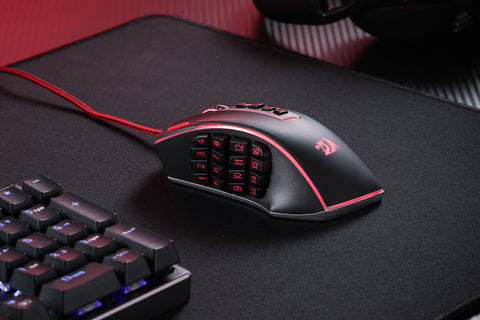
Step into the gaming arena with the Redragon M990 MMO Gaming Mouse, a high-precision, wired RGB marvel designed for the serious gamer. This mouse stands out with an extraordinary 32000 DPI range, customizable via its 23 programmable buttons, including 16 dedicated macro keys, making it a powerhouse for MMO gaming.
At its core, the M990 is equipped with the Optical Pixart 3389 sensor, offering a remarkable accuracy with a 50g acceleration. It's tailored for gamers who demand the highest level of control and precision.
The mouse features an adjustable polling rate of 1000Hz, ensuring that every movement is captured with high responsiveness. Additionally, it comes with adjustable weights (8x2.4g each), allowing you to fine-tune the balance and feel to your personal preference.
The solid aluminum base adds to its durability, while the redefinable DPI levels (ranging from 1000 to 16000, and extendable up to 32000 via software) cater to all gaming scenarios. The Redragon M990 is not just a tool, but a statement in gaming technology.
Redragon M686 Wireless Gaming Mouse: Versatility Meets Precision
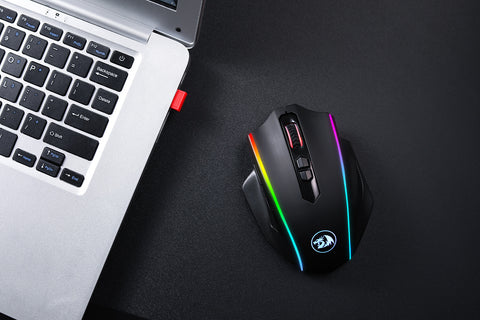
Introducing the Redragon M686 Wireless Gaming Mouse, a versatile choice for gamers who value both wireless freedom and wired reliability. With a high-performance 16000 DPI, easily adjustable for varying gameplay needs, this mouse is a perfect ally for any gaming genre.
At its heart lies the PAW3335 Optical Pixart sensor, delivering exceptional precision with a 40G acceleration. This level of accuracy is further enhanced by a 1000Hz polling rate, ensuring every move is captured with utmost responsiveness.
Designed for prolonged gaming sessions, the M686 boasts a durable 45-hour battery life, ensuring you remain in the game without frequent interruptions. The mouse also offers extensive customization options, from programmable macros to an adjustable RGB backlight, allowing you to personalize your gaming experience.
Whether used with a PC, Mac, or laptop, the Redragon M686 adapts seamlessly to your gaming setup. Its ergonomic design provides comfort, while the option to switch between wired and wireless modes offers unmatched flexibility.
BOTTOM LINE
In conclusion, when considering a mouse's polling rate, it is crucial to understand that a higher polling rate generally results in more responsive and precise cursor movements. For gaming purposes, a polling rate between 500Hz and 1000Hz is commonly preferred to ensure swift and accurate responses to user input. However, individual preferences and specific gaming scenarios may influence the optimal polling rate. It is recommended to experiment with different rates to find the one that best suits your needs and enhances your overall gaming experience.
FAQ:
Monitor Refresh Rate: Why It Matters
A higher monitor refresh rate is crucial for gaming as it determines how many times the screen refreshes per second, measured in Hertz (Hz). This directly impacts the smoothness and responsiveness of gameplay. A higher refresh rate, such as 144Hz or 240Hz, results in smoother motion, reduced motion blur, and an overall enhanced gaming experience, particularly in fast-paced genres where quick reactions are essential.
Do I Need a New Mouse or Monitor?
Whether you need a new mouse or monitor depends on your current gaming setup and preferences. If your mouse lacks precision or desired gaming features, an upgrade may enhance your gaming experience. Similarly, consider a new monitor if you notice limitations in resolution, refresh rate, or response time affecting your gameplay. Upgrading either component can significantly boost overall gaming performance, providing a smoother and more responsive gaming environment tailored to your needs.
































